Charting Out the Master’s Plan: Interview with Kirk Franklin On His Book The Blueprint
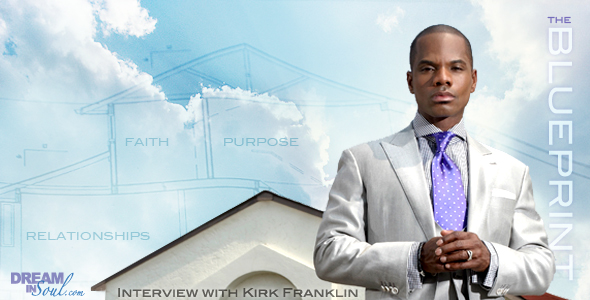
Pursuing A Life Mapped By the Maker
His music and ministry spans generations. From producer, to musician, speaker and host, Kirk Franklin’s ability to be both light-hearted with humor and raw with realness and honesty draws in people of all ages and backgrounds. Adding a new level of transparency and spiritual insight, Kirk Franklin launches his first book The Blueprint: A Plan for Living Above Life’s Storms on May 18. In the book he charts a guide of personable wisdom speaking on everything from faith and marriage to race and life in the black community. “The Blueprint” aims to inspire anyone to view and plan his or her life from an unearthly perspective.
Kirk Franklin spoke to Dream in Soul about the vision of the book, his ministry expanding into the Twitterverse, his definition of success, and creating a bridge between contemporary Christian and gospel music. Tune into the conversation below:
Dream in Soul: Hi, thank you so much for talking to me today, it’s such an honor. I wanted to start out by asking you what inspired you to write this book at this point in your life and what was your vision in writing it?
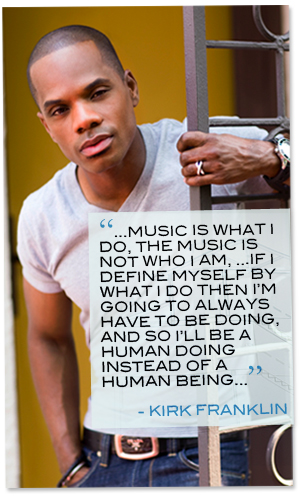
KF: The book came about because I’ve been doing a lot of public speaking, and speaking at colleges, churches, and conferences, and so people thought that it would be good that I did a book. So a couple of publishers became interested in the idea, and now here we are with “The Blueprint.”
DS: What was your vision, did you have a specific age group in mind when writing the book or is it for everyone?
KF: Not a particular age, I was just really trying to write a book that really could resonate with you whether you are young, old, single, married… I just wanted to talk about all of these different areas of life from a godly perspective, and so that was my attempt.
DS: Did the writing process bring out any new revelations in yourself and your own life?
KF: Well you know for me I was so busy trying to put it out that it’s been very interesting for me to go back and read the book, because after reading the book it’s like “Oh wow, that was good,” you know. It’s kind of hard to explain, you can be so consumed with putting out and just dumping everything that’s inside of you that a lot of it is not always resonating. It’s only when you finish it you’re looking back at it.
DS: Definitely, one of the chapters that spoke to me was Chapter 4 “What is Purpose.” One of the important points you made in the book is that what people do does not define who they are. Was there a point in your life where you realized that?
KF: Yeah, yeah definitely there was a point in my life when that revelation really became true to me. It kind of resonates within me that you know music is what I do, the music is not who I am, so if I sell a lot of records that doesn’t make me who I am. If I don’t sell any records that doesn’t take away from who I am, and if I define myself by what I do then I’m going to always have to be doing, and so I’ll be a human doing instead of a human being. So, that was a very important thing for me to learn.
DS: Do you think we put pastors or musicians on pedestals, defining them by their titles?
KF: Ah, yes, you know we all have got to be careful with titles. You know we’ve got to be very careful with it because titles can create this pseudo-identity that many people start reading into.
DS: Going along with that once I saw a tweet you tweeted a while back that said, “never let your gift become your god.” Can you talk about that and how you’ve learned that in your ministry; how does someone know when their gift or career has become an idol?
Below: A Tweet from @KirkFranklin
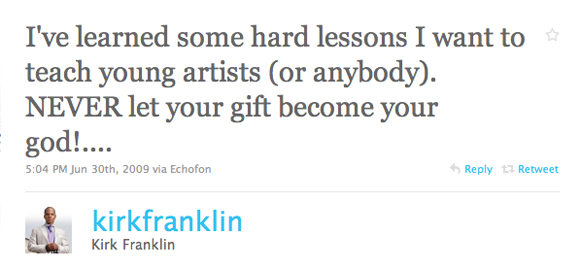
Listen to Kirk Franklin Answer Below
KF: Well, it’s just very important to see your gift through God’s lens. Once you realize that the gift really wasn’t for your benefit but the gift was really for His and He allows you to partake in it, it changes your perspective. It’s like, ok this is given to me to bring Him glory, not necessarily to bring myself glory. And so when you see that it’s something that’s on loan that you’re not an owner of it, you’re just a manager of it, then you respond differently.
DS: Definitely. I love how you’ve expanded your ministry on to the web with “Twitter Church” and allowing people to ask you questions on Youtube. How has your ministry changed for you as you speak with people more personally and are so transparent online?
KF: Well you know it’s just an expansion for me of everything that I’ve been doing and just everything that I just continue to do. So for me its just like another opportunity to just continue to be what I’m trying to be for a generation.
DS: So with all of the awards and fame, and other things you’ve experienced how would you define true success in your life?
KF: Well for Kirk, true success is having a happy marriage, well let me change that, not happy but healthy. Having a healthy marriage, you know, an engaged marriage that brings God glory, having children that reflect my heart as a father… Those are the things that really define, if you want to use the word “success,” those are the successful things for me.
DS: I know you work a lot with youth, especially with The Takeover ministry. I wanted to ask what’s a main road block you see for youth today?
KF: Well the greatest roadblock right now in our society to me is disengaged parents, parents who just wanted the children then just let them raise themselves. That is the worst thing that’s happening right now, you know I work with kids whose parent have no connection to their spiritual and emotional development, and it’s just very misfortunate.
DS: What is one important piece of advice you wish you had as a teen or young adult, that you would give to youth?
KF: Aw man, I would just say to them that they are a rose growing out of concrete… Good things and great things do come from the most troubled beginnings and from the most difficult situations that are happening in people’s lives, that God can still use those things and use them for the positive.
DS: In the book you talk about so many important issues from racism to relationships. What do you hope people take as a whole from the book and what do you hope they do after reading it?
KF: Well hopefully this book will always be like a manual that they can always go back and reread at different points in their lives, like if you’re single hopefully the single chapter is something you can really digest on. If a single person gets married they can go back and look at the married chapters. So hopefully it can be a book that’s part of their journey.
DS: Absolutely, I wanted to thank you for inspiring us with “Are You Listening” the song for Haiti. What message do you have for those in Haiti now with the news less focused on them, or anyone else going through devastation?
KF: Well what I would say to my Haitian brothers and sisters, don’t let the silence let you think that there’s no love. You know, even if people in America are going through difficult times themselves there are still people here that are passionate and care about the plight of the Haitian brothers and sisters, and so there is a community here of people that still love and are concerned about their Haitian brothers and sisters. Just don’t discouraged by the silence that you hear right now because the silence doesn’t mean there’s not love.
DS: Definitely, thank you so much for that word. I also know you had a chapter that touches on race in the black community and how we relate to others. Do you think there’s something that can be done in the Gospel music community or in the church to create a bridge between the different genres within Gospel music, or is it mainly caused by audiences?
KF: When it comes to Contemporary Christian Music and Black Gospel Music?
DS: Yes.
KF: Yeah, well you know that’s something that many of us are passionate about, there’s a few that are really passionate about it. You know, we understand that stylistically there are some differences and that’s just true. I mean there are different aisles that white people listen to, black people listen to you know like Black Gospel radio and may not listen to Christian rock, and that’s understandable… but we’ve still got to be sensitive to those doors that do allow us in on each other’s lives…. So those doors should even exist in Christian music.
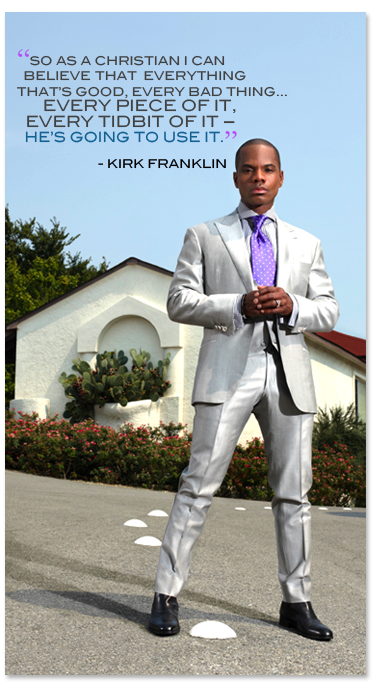
DS: Are you working on new music right now?
KF: Within the next couple of months I plan on, God’s will, to do that. So I’m planning on doing that really soon.
DS: Great, so how are you feeling about this season of Sunday Best?
KF: You know, I hope that ya’ll enjoy it, we’ve got some really great finalists. I’m just looking forward for you all to get to see it. I’m very excited about it.
DS: Do you have a life’s scripture or a main scripture that encompasses the message of your life so far?
KF: Yeah, there’s a scripture in Romans 8:28 that says:
We know that all things are working together for the good of them that love the Lord, those who are called according to His purpose.
So as a Christian I can believe that everything that’s good, every bad thing every ugly thing, every piece of it, every tidbit of it – He’s going to use it.
DS: Yes, definitely. Well thank you so much for taking the time to speak to me today, again it’s such an honor.
KF: Thank you so much.
DS: Thanks and have a great day.
The Blueprint: A Plan for Living Above Life’s Storms is available online and in stores on May 18. Click here to order from Amazon.com. Click here to visit Kirk Franklin’s website for dates for his book tour.
The Book’s Description from the Publisher
Kirk Franklin’s faith wasn’t always as strong as it is today. When he was growing up, he lacked a good blueprint for living and for being a man. His father abandoned his family; his mother constantly told Kirk that he was an unwanted child; his sister became a crack addict; he never saw a black man who was faithful in marriage.
So how did Franklin get from there to here? How did he overcome these early hardships and go on to become the bestselling gospel musician in recent history, as well as a devoted husband and loving father? And how do we teach today’s young men not to define manhood from society’s point of view? In The Blueprint, Franklin will discuss his own life and struggles, and offer an inspiring guide to help readers build their own blueprint for life – partly through a relationship with God, and partly through an understanding of reality. These are not church stories – while they ultimately contain a message of hope, they deal with real issues. Franklin hasn’t achieved unprecedented popularity and true crossover appeal by preaching. Instead, his audience trusts him because he is honest and open and speaks authentically.
Franklin gives a no-holds-barred account of his life and struggles as a son, a father, a husband, a singer, an African American, and a Christian. He tackles tough topics like deadbeat dads and the high divorce rate in the black community; the true definition of manhood; the difficulties and rewards of a strong marriage; the consequences of sex and the responsibilities of parenthood; the strengths and shortcomings of religion; and the hope that can be found through faith. At the end of each chapter, Franklin offers readers questions and discussion topics to be used in groups or for their own private contemplation.
Scripture says faith without work is dead. Kirk Franklin also believes that faith without honesty is dead, and that faith that takes place only in the church is dead. In The Blueprint, Franklin takes faith out of the church pews and into the reality of our everyday lives, with the honesty and street flair he’s known for.
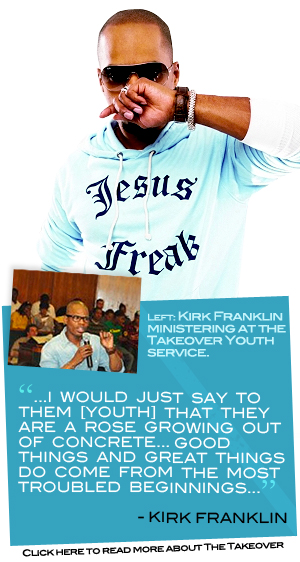




 Click here to share this Word
Click here to share this Word